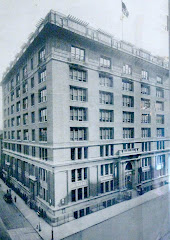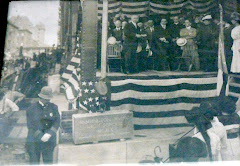A famous scene from one of her most famous pictures with Clark Gable
continuing her biography:
In 1958, she returned to Broadway in The Marriage-Go-Round, for which she was nominated for a Best Actress Tony Award.
By 1955 she had stopped making films, although returned to the screen in Parrish (1961) for Warner Brothers. When the film was released, most of the studio publicity was in support of the young male lead Troy Donahue, who was being groomed by the studio. Colbert, playing the supporting role of Donahue's mother, received little attention, and the film was not a success. She never made another film although the press occasionally referred to upcoming projects that did not exist. Embarrassed, Colbert instructed her agent to stop his attempts to generate interest in her as a film actress. In the late 1960s, a reporter asked her why she had made no more films, to which she replied, "Because there have been no offers."
Her occasional acting ventures were limited to theater and included The Irregular Verb to Love (1963); The Kingfisher (1978) in which she co-starred with Rex Harrison, and Frederick Lonsdale's Aren't We All? (1985).
In 1987, Colbert appeared in a supporting role in the television miniseries The Two Mrs. Grenvilles. The production was a ratings success and was nominated for several awards. Colbert won a Golden Globe and received a nomination for an Emmy Award. This marked her final performance on film, however she continued to act in theater.
In 1928, Colbert married Norman Foster, an actor and director, who appeared with Colbert in the Broadway show The Barker. However, she and her first husband lived apart, never sharing a home together in Hollywood. They divorced in 1935, and in December of that year, Colbert married Dr. Joel Pressman, a surgeon at UCLA. The marriage lasted 33 years, until Pressman's death of liver cancer in 1968.
Colbert had one brother, Charles (1898-1971), who used the surname Wendling and served as her agent and business manager for a time. He is credited with negotiating some of the more lucrative of her contracts in the late 1930s and early 1940s.
Colbert was a staunch Republican and conservative.
For years, Colbert divided her time between her apartment in Manhattan and her summer home in Speightstown, Barbados. After suffering a series of strokes in 1993, she remained in her Barbados home, Belle-rive, where she died on July 30, 1996, at age 92. She was buried in the Parish of St. Peter Cemetery in Barbados. Colbert left no immediate family.
The bulk of Colbert's estate was left to a friend, Helen O'Hagan, a retired director of corporate relations at Saks Fifth Avenue, whom Colbert had met in 1961 on the set of the her last film and who cared for Colbert following her 1993 strokes.
Colbert established one of the most successful film careers of any actress of her generation, and was considered a dependable and bankable star. Her status was reflected in her earnings as one of the best-paid performers of the 1930s and 1940s. Colbert once commented that she had sacrificed for the sake of her career.
In discussing Colbert's career, her contemporaries confirmed her drive. Irene Dunne commented that she had lacked Colbert's "terrifying ambition" and noted that if Colbert "finished work on a film on a Saturday, she would be looking for a new project by Monday". Hedda Hopper wrote that Colbert placed her career "ahead of everything save possibly her marriage", and described her as the "smartest and canniest" of Hollywood actresses, with a strong sense of what was best for her, and a "deep rooted desire to be in shape, efficient and under control".






0 Comments:
Post a Comment